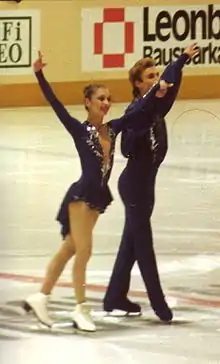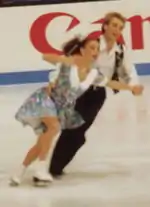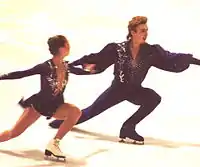| Maya Usova | |||||||||||||||||||||||||||||||||||||||||||||||||||||||||||||||||||||||||||||||||
|---|---|---|---|---|---|---|---|---|---|---|---|---|---|---|---|---|---|---|---|---|---|---|---|---|---|---|---|---|---|---|---|---|---|---|---|---|---|---|---|---|---|---|---|---|---|---|---|---|---|---|---|---|---|---|---|---|---|---|---|---|---|---|---|---|---|---|---|---|---|---|---|---|---|---|---|---|---|---|---|---|---|
 Usova/Zhulin at a 1989 exhibition in West Berlin. | |||||||||||||||||||||||||||||||||||||||||||||||||||||||||||||||||||||||||||||||||
| Full name | Maya Valentinovna Usova | ||||||||||||||||||||||||||||||||||||||||||||||||||||||||||||||||||||||||||||||||
| Other names | Maia Usova | ||||||||||||||||||||||||||||||||||||||||||||||||||||||||||||||||||||||||||||||||
| Born | 22 May 1964 Gorky, Russian SFSR, Soviet Union | ||||||||||||||||||||||||||||||||||||||||||||||||||||||||||||||||||||||||||||||||
| Height | 1.60 m (5 ft 3 in) | ||||||||||||||||||||||||||||||||||||||||||||||||||||||||||||||||||||||||||||||||
| Figure skating career | |||||||||||||||||||||||||||||||||||||||||||||||||||||||||||||||||||||||||||||||||
| Country | |||||||||||||||||||||||||||||||||||||||||||||||||||||||||||||||||||||||||||||||||
| Skating club | Profsoyuz Moskva / Sportsclub Moskva | ||||||||||||||||||||||||||||||||||||||||||||||||||||||||||||||||||||||||||||||||
| Retired | 1994 | ||||||||||||||||||||||||||||||||||||||||||||||||||||||||||||||||||||||||||||||||
Medal record
| |||||||||||||||||||||||||||||||||||||||||||||||||||||||||||||||||||||||||||||||||
Maya Valentinovna Usova (Russian: Майя Валентиновна Усова; born 22 May 1964) is a Russian former ice dancer. With Alexander Zhulin, she is a two-time Olympic medalist (1994 silver, 1992 bronze), the 1993 World champion, and the 1993 European champion. They also won gold medals at Skate America, NHK Trophy, Nations Cup, and Winter Universiade. They represented the Soviet Union, the Unified Team, and Russia.
Career
Maya Usova initially competed with Alexei Batalov. At the age of nine, she moved from Gorky to Moscow to train with coach Natalia Dubova.[1] Dubova paired her with Alexander Zhulin in 1980. In 1988, they made their first appearance at the European Championships, placing fourth. The next season, they won silver at the 1989 European Championships in Birmingham, England and silver in their World Championships debut, in Paris. They maintained their silver medal standing in the world with a silver at the 1990 European Figure Skating Championships, but for the first time dropped behind the Duchesnays to third at the 1990 World Figure Skating Championships in Halifax.
After being third again at the 1991 European Figure Skating Championships, they looked poised for the big breakthrough, for the first time leading their teammates Klimova & Ponomarenko after the compulsories, then leading both the Duchesnays and Klimova & Ponomarenko into the free dance at the 1991 World Figure Skating Championships. However the top 3 teams were so close the final finish of the free dance order would determine the final results. Maya Usova & Alexander Zhulin skated a strong free dance that seemed to ensure the title, but had drawn first in the final flight, and received a wide spread of marks from the judges. Despite receiving four first place ordinals in the free dance, a strange ordinal situation caused them to place third in the free dance and drop from first to third in the end. They later described their 1991 free dance as "being about Paganini and his muse".[2] Usova wore a short, Empire-style beige dress and according to writer Ellyn Kestnbaum, represented both a muse and inanimate object. Kestnbaum also reported that they skated their program with "intense emotion" and created "an overall aura of Romanticism and uncanniness", using little runs and turns on their toepicks, knee slides, and "sensuous flowing and intertwining movements" that were enhanced by their billowing costumes.[2]
In the 1991–92 season, Usova/Zhulin won silver at the 1992 European Championships in Lausanne, Switzerland and then captured their first Olympic medal, bronze, at the 1992 Winter Olympics in Albertville, France. Usova/Zhulin ended their season with a controversial silver at the 1992 World Championships in Oakland, California despite a fall in the free dance. They moved with Dubova from Moscow to Lake Placid, New York in September 1992.[3][4]
In the 1992–93 season, Usova/Zhulin won the 1993 European Championships in Helsinki and the 1993 World Championships in Prague. This was a commanding victory as they won all four phases of the competition at both events, and received straight first place ordinals, apart from losing two first place ordinals to the up-and-coming Russians Anjelika Krylova & Vladimir Fedorov at Worlds.
Usova and Zhulin's free skate during the 1991-1992 season, set to music from The Four Seasons by Vivaldi, centered on the theme of statues coming to life, was full of images of symmetry, parallelism, and equality. Figure skating writer Ellyn Kestnbaum described their program in this way: "It is not about sexual difference, but it does convey sexual attraction. These are passionate, eroticized statues, and the skaters' gazes are focused centripetally into the relationship, at each other's bodies and into each other's eyes".[5]
The next season, they were third at the 1994 European Championships in Copenhagen, behind Jayne Torvill / Christopher Dean and Oksana Grishuk / Evgeni Platov. They appeared to have the gold medal won as they entered the free dance tied for first with Torvill & Dean, and Grishuk & Platov were mathematically out of contention for the gold medal entering the free dance. However the free dance of Grishuk & Platov which handily won that phase changed the ordinals, and Usova & Zhulin were pushed to third in the free dance behind Torvill & Dean and dropped to third overall. They were heavily criticized for their new free program which was said by critics to lack speed and be too far a departure from their usual sensual and elegant style of dancing.
At the 1994 Winter Olympics in Lillehammer, Norway, they won the silver medal behind Grishuk/Platov. They entered the free dance tied for first with Torvill & Dean, with Grishuk & Platov in third, but with all 3 teams in contention for the gold by winning the free dance. They lost gold by the majority rule, Grishuk & Platov having the five first place ordinals they needed to win the free dance. After the loss Usova & Zhulin withdrew from the 1994 World Figure Skating Championships, where they had planned to end their amateur career and immediately went professional. Usova and Zhulin were known for excelling technically and artistically and according to writer Ellyn Kestnbaum, "leaned toward drama and passion".[2]
Usova/Zhulin skated together professionally from 1994 to 1997. They toured with Champions on Ice and won the World Professional Championships. From 1998 to 2000, Usova performed with former rival, Evgeni Platov. Coach Tatiana Tarasova discussed the challenges of pairing Platov, in prime competitive shape, with Usova, a long-time smoker who was nearing retirement. She designed their programs to include many lifts, where Platov was carrying Usova around the ice. Their career started out with mixed results, with marks as low as 4.5 at the Canadian Open, but also an upset win at the World Professional Championships. After last-place finishes in nearly all events in 1999 and 2000, Usova & Platov ceased competing.
From 2002 to 2004, Usova was an assistant coach to Tatiana Tarasova and Platov, working with Galit Chait / Sergei Sakhnovsky and Shizuka Arakawa. She has coached at the Igloo in Mt. Laurel, New Jersey and Odintsovo, near Moscow. She is an International Technical Specialist for Russia.[6]
Personal life
Usova and Zhulin were married in 1986[4] but later divorced.[7] Zhulin claimed that their marriage was a sham to get a free apartment from the Soviet government, though Usova denied this claim.[8]
In 1992, Usova grabbed Grishuk by her hair and smashed her head against the counter at a Spago restaurant in Los Angeles.[9] The rivalry between Grishuk and Usova continued, and when Grishuk and Platov defeated Usova and Zhulin at the 1994 Olympics, Usova fell into a deep depression. According to television interviews, Usova was hospitalized 17 times for depression. The rivalry between Usova and Grishuk continued when Usova, then partnerless, relocated to Marlborough, Massachusetts, the town where Grishuk trained with Platov. She began showing up at Grishuk's practice sessions, often blocking Grishuk's entrance to the rink while smoking cigarettes and muttering curse words.[10]
Usova is remarried to a Russian professor in medicine, Anatoly Orletsky.[11] In 2010, she gave birth to their daughter, Anastasia. Off the ice, she has appeared in several Marlboro advertisements in Russia.
Programs
With Zhulin


| Season | Original dance | Free dance[12] | Exhibition[13] |
|---|---|---|---|
| 1993–1994 |
|
|
|
| 1992–1993 |
|
|
|
| 1991–1992 |
|
| |
| 1990–1991 |
|
|
|
| 1989–1990 |
|
|
|
| 1988–1989 |
|
|
|
| 1987–1988 |
|
|
| Post-1994[13] |
|---|
|
With Platov
| Season | Programs[12][13][14] |
|---|---|
| 2000–2001 |
|
| 1999–2000 |
|
| 1998–1999 |
|
Results
Amateur career
With Zhulin for the Soviet Union (URS), Commonwealth of Independent States (CIS), Unified Team at the Olympics (EUN), and Russia (RUS):
| International | ||||||||||||
|---|---|---|---|---|---|---|---|---|---|---|---|---|
| Event | 1982–83 (URS) |
1983–84 (URS) |
1984–85 (URS) |
1985–86 (URS) |
1986–87 (URS) |
1987–88 (URS) |
1988–89 (URS) |
1989–90 (URS) |
1990–91 (URS) |
1991–92 (CIS, EUN) |
1992–93 (RUS) |
1993–94 (RUS) |
| Olympics | 3rd | 2nd | ||||||||||
| Worlds | 2nd | 3rd | 3rd | 2nd | 1st | |||||||
| Europeans | 4th | 2nd | 2nd | 3rd | 2nd | 1st | 3rd | |||||
| Skate America | 1st | 1st | ||||||||||
| Nations Cup | 1st | |||||||||||
| NHK Trophy | 2nd | 1st | 1st | 1st | ||||||||
| Moscow News | 6th | 4th | 3rd | 2nd | ||||||||
| Goodwill Games | 2nd | |||||||||||
| Nebelhorn | 1st | |||||||||||
| St. Gervais | 1st | |||||||||||
| St. Ivel / Electric | 1st | 1st | ||||||||||
| Universiade | 1st | 2nd | ||||||||||
| National | ||||||||||||
| Soviet Champ. | 2nd | 5th | 3rd | 3rd | 3rd | 3rd | 2nd | 1st | ||||
| Spartakiada | 1st | |||||||||||
| USSR Cup | 3rd | |||||||||||
Post-eligible career
| Event | 1994–95 | 1998–99 |
|---|---|---|
| World Professional Champ. | 1st | 1st |
References
- ↑ Harvey, Randy (22 February 1994). "'94 WINTER LILLEHAMMER OLYMPICS : Torvill and Dean Must Face Music as Russians Win : Ice dancing: British routine doesn't go over with judges. Gritschuk and Platov get gold". Los Angeles Times. Retrieved 8 October 2011.
- 1 2 3 Kestnbaum, Ellyn (2003). Culture on Ice: Figure Skating and Cultural Meaning. Middleton, Connecticut: Wesleyan Publishing Press. p. 234. ISBN 0-8195-6641-1.
- ↑ Reiter, Susan (1 March 1995). "Ice dancing: a dance form frozen in place by hostile rules". Dance Magazine. The Free Library. (FindArticles)
- 1 2 Hersh, Phil (22 February 1994). "Love Triangle (plus 1) Tops Torvill And Dean". The Chicago Tribune. Retrieved 9 September 2011.
- ↑ Kestnbaum, p. 237
- ↑ "ISU Communication No. 1467". International Skating Union. Archived from the original on 3 February 2009.
- ↑ Sports-reference: Maiya Usova
- ↑ Shipley, Amy (11 December 1998). "PLAYING MUSICAL CHAIRS ON ICE". Washington Post. ISSN 0190-8286. Retrieved 27 October 2023.
- ↑ Longman, Jere (2 January 1998). "SKATING; Dancing on the Sharp Edge of Her Skates". The New York Times. ISSN 0362-4331. Retrieved 27 October 2023.
- ↑ "«Платов всегда был в меня влюблен. Это сковывало и закрывало». Интервью суперфигуристки Оксаны Грищук, которая 30 лет живет в США". Sports.ru. Retrieved 26 August 2022.
- ↑ Vaytsekhovskaya, Elena (24 January 2009). Майя Усова: "Тем, кто не уехал, надо ставить памятники". Sport Express (in Russian). (Translation - Maya Usova: “Those who remained are real heroes”)
- 1 2 Skate Music List Archived 2 April 2012 at the Wayback Machine
- 1 2 3 World Professional Figure Skating Championships – Landover, MD
- ↑ Japan Open
External links
1992 Olympics free skate (YouTube clip)
![]() Media related to Maya Usova at Wikimedia Commons
Media related to Maya Usova at Wikimedia Commons